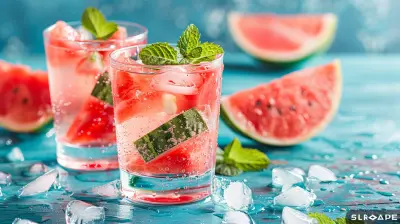Exploring the Link Between Dehydration and Prolonged Cold Symptoms
16 June 2025
When you catch a cold, rest, fluids, and maybe some chicken soup are usually the go-to remedies. But have you ever wondered why your cold seems to stick around longer than expected? One sneaky culprit might be dehydration.
Most people don’t associate dehydration with prolonged cold symptoms, but staying properly hydrated plays a massive role in your body's ability to fight off illness. Let’s dive into how dehydration affects your recovery and what you can do to prevent it.

How Does Dehydration Affect the Body?
Before we zoom in on colds specifically, let's break down what happens when your body lacks adequate hydration.Water is essential for nearly every function in the body. It helps regulate temperature, transport nutrients, and flush out toxins. When you're dehydrated, your body struggles to perform these vital tasks, throwing off your immune system and making recovery from illnesses (like the common cold) more difficult.
Signs of Dehydration
Many people assume they're drinking enough water, but dehydration can sneak up without you realizing it. Some common signs include:- Dry mouth and throat
- Dark yellow urine
- Headaches
- Fatigue
- Dizziness
- Dry skin
Now, imagine dealing with these symptoms on top of a lingering cold. Not a fun combination, right?

The Connection Between Dehydration and Prolonged Cold Symptoms
So how does dehydration make a cold stick around longer? The answer lies in how water supports your immune system and helps your body clear out infections.1. Mucus Production and Hydration
Mucus might seem gross, but it plays a crucial role in trapping viruses and helping your body expel them. When you're dehydrated, your mucus becomes thicker and stickier, making it harder to clear out germs. Instead of coughing or blowing out the virus, your body struggles with sluggish drainage, which can prolong symptoms.2. Immune System Weakness
Your immune system depends on proper hydration to function effectively. White blood cells (your body's defense troops) need water to move efficiently and fight off infections. When you're dehydrated, those cells slow down, giving the virus more time to wreak havoc in your system.3. Slow Toxin Removal
Your kidneys and liver help flush out toxins, but they need water to do their job properly. Insufficient hydration means these organs work less efficiently, allowing waste and lingering viruses to stay in your body longer than necessary.4. Increased Fatigue
A cold already drains your energy, but dehydration makes it even worse. Your body has to work harder to function, leaving you feeling extra sluggish. This can make it harder to get up, move around, or even do basic self-care—things that actually help you recover faster.5. Worsening Symptoms Like Sore Throat and Congestion
If you've ever had a dry, scratchy throat while sick, you know how miserable it can be. Lack of fluids only adds to this discomfort, making your sore throat worse. Additionally, without enough moisture, your nasal passages dry out, leading to more congestion and irritation.
How to Stay Hydrated While Battling a Cold
Okay, so we now know dehydration is not your friend when you're sick. But how can you ensure you’re drinking enough fluids while dealing with a cold? Let’s go over some practical tips.1. Keep Water Within Arm’s Reach
When you're sick, even small tasks feel like a chore. Keeping a water bottle next to your bed or couch makes it easier to sip throughout the day.2. Add Electrolytes When Needed
If you have a fever or are sweating more than usual, you might be losing essential electrolytes like sodium and potassium. Drink coconut water, sports drinks (in moderation), or homemade electrolyte solutions to replenish these minerals.3. Opt for Warm Fluids
Warm drinks like herbal tea, broths, or hot lemon water help soothe your throat, keep your nasal passages moist, and promote hydration. Plus, they give you that cozy, comforting feeling when you're feeling under the weather.4. Eat Hydrating Foods
Not a fan of drinking plain water all day? No worries! You can also get hydration from foods like:- Soups and broths
- Cucumbers
- Watermelon
- Oranges
- Yogurt
5. Avoid Dehydrating Beverages
Some drinks can make dehydration worse, like coffee, alcohol, and sugary sodas. While a small amount of caffeine might be okay, too much can have a diuretic effect, increasing fluid loss.6. Set Reminders to Drink Water
When you're wrapped up in blankets, binge-watching your favorite show, it's easy to forget to drink water. Set reminders on your phone or use a water tracking app to keep yourself accountable.
Can Drinking Too Much Water Be Harmful?
While hydration is essential, it’s also possible to overdo it. Overhydration (also called water intoxication) happens when you drink excessive amounts of water without enough electrolytes. This can lead to an imbalance in your body's sodium levels, causing symptoms like nausea, confusion, and headaches.The key is balance—listen to your body, drink when you're thirsty, and eat nutrient-dense foods to support hydration.
Final Thoughts
Getting over a cold can be frustrating, especially when symptoms seem to drag on forever. But one simple step—staying properly hydrated—can make a significant difference in how quickly you recover.Water helps thin mucus, boost your immune system, flush out toxins, and prevent unnecessary fatigue. So next time you feel under the weather, don’t just reach for the tissues—grab a big glass of water too.
all images in this post were generated using AI tools
Category:
Cold And FluAuthor:

Arthur McKeever
Discussion
rate this article
2 comments
Kenna McKibben
Thank you for shedding light on this important connection. It’s easy to overlook hydration during illness, yet it plays a vital role in recovery. Your insights can help many people understand the significance of staying hydrated, especially when battling persistent cold symptoms. Every bit of care counts for our health!
June 21, 2025 at 4:27 AM

Arthur McKeever
Thank you for your thoughtful comment! I'm glad you found the insights valuable—hydration truly is crucial for recovery. Your support means a lot!
Faelith Rogers
Hydration plays a crucial role in our overall health, especially during illness. Understanding the connection between dehydration and prolonged cold symptoms emphasizes the importance of drinking enough water. Simple measures, like staying hydrated, can significantly support recovery and enhance our body's natural defenses against infections.
June 19, 2025 at 4:37 PM

Arthur McKeever
Thank you for your insightful comment! Hydration is indeed essential for recovery and supports our immune system effectively.


